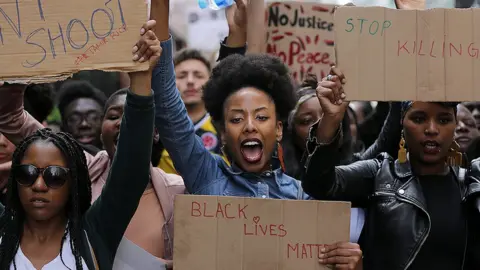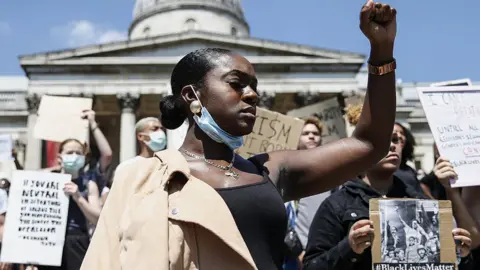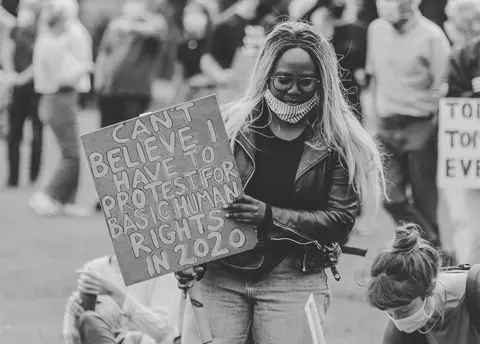Black Lives Matter in the UK: 'We're still not being heard'
 Getty Images
Getty ImagesWhat's in your Instagram Stories today - is it packed with Black Lives Matter content from around the UK?
Probably not. That peaked here earlier in the summer, when British people marched in solidarity with the Black Lives Matter movement and big UK protests trended on social media.
At first, our feeds were full of messages and images of George Floyd and Breonna Taylor, along with the police officers accused of being responsible for their deaths.
Then we learned names like Elijah McClain,Tony McDade and Dion Johnson - more black people who died during encounters with US police.
But there were worries in June that Black Lives Matter would be just a trend for some people.
Two months later, Black Lives Matter events in the UK are rarely in the news and it's business as usual on Twitter.
America's ongoing protests have made some headlines - but that's mostly been because of violence or federal agents driving protesters away in unmarked cars.
But Black Lives Matter is still moving, and still marching, in the UK.
"Despite the fact there's not a lot of media attention - that there's not as many people as there was in the beginning - the amount of people that come out are still able to make a change and have their voices heard," 18-year-old Aima tells Radio 1 Newsbeat.
She helped organise protests in Central London in June that attracted thousands of supporters. And she's been marching every week since.
The organisation she's part of - All Black Lives UK - is responsible for ongoing marches in Manchester, Bristol, Sheffield, Leeds and more.
It's a different organisation to the US group Black Lives Matter, which faced anti-semitism claims about a tweet which said "Free Palestine."
Within the Black Lives Matter movement, there are different groups at work, like the one Aima is part of in the UK.
'Government hasn't engaged'
Aima says protests can engage with people who happen to see them, but she doesn't believe the movement's message is reaching people at the top.
"There hasn't really been a lot of direct engagement between the government and a lot of the Black Lives Matter organisations in this country," she says.
"I feel like we are being ignored and we aren't being directly spoken to."
Allow X content?

Following the Black Lives Matter marches, Prime Minister Boris Johnson announced an inquiry into racial inequality - but faced criticism for saying the UK is not "a racist country" and his use of the word "thuggery" to describe protesters.
Labour leader Keir Starmer saying Black Lives Matter was a "moment" not a movement "really angered" the people working on Black Lives Matter events, Aima says.
And a recent BBC News broadcast which used the n-word left Aima and her fellow organisers "completely shocked", proving to her "there's more that needs to be done".
 Getty Images
Getty Images"It just feels like we aren't being heard and we aren't being taken seriously," Aima adds.
"Discussions are being had but I think that's more of a society thing, not in the government. The people in power aren't talking about it."
That feeling is shared by Khady Gueye.
The 24-year-old organised a protest in the Forest of Dean, Gloucestershire, that faced opposition from locals and authorities.
"Racism is one of those issues that's very easy for people in positions of authority to state publicly they don't agree with," Khady says.
"But what policies are they putting in place or what are they doing in their position of authority to actually make a difference?
"I feel like - particularly around here - that's just gone completely unnoticed and isn't something anybody seems to be actively pursuing."
'There isn't that presence any more'
Khady's local MP, Conservative Mark Harper, opposed the Forest of Dean Black Lives Matter demonstration due to lockdown restrictions. He faced criticism following the protest for not immediately removing abusive comments towards Khady and her friend Eleni Eldridge-Tull on his Facebook page.
But Khady says even those incidents can have a positive effect because they spark conversations that might not have happened before the protest.
"Even when people are pointing things out because they don't agree with BLM, they are still opening up that dialogue and allowing people who do agree to speak about their opinions and share their thoughts.
"There are still conversations happening, and whether those conversations are positive or negative, it's still there."
 Jess Sterry Photography
Jess Sterry PhotographyKhady was pleased to see the Edward Colston statue toppled in Bristol and the removal of the slave-trader's name from (the former) Colston Hall.
And since their protest Eleni and Khady have set up the Local Equality Commission, which seeks to support black and ethnic minority groups in rural areas.
But she says changes are becoming "less common the more time goes on".
"I don't like to use the word - but there was a 'hype' around the Black Lives Matter movement when it first happened," Khady adds.
"There isn't that presence any more and I think it's really important that we continue to stress the messages of Black Lives Matter.
"As individuals, we have to be persistent and continue those conversations, open that dialogue and ensure we are doing our part to enforce change and keep highlighting those issues - because they're not going away."
'Speak to people directly'
Aima, who's planning marches until the end of August, says she wants to see "more and more" people marching on the streets.
But she agrees real-life conversations are important.
"You can retweet all you want," she says.
"But if you don't go to the people who are closest to you and talk about the issues people are facing in this world, then you aren't really helping."


